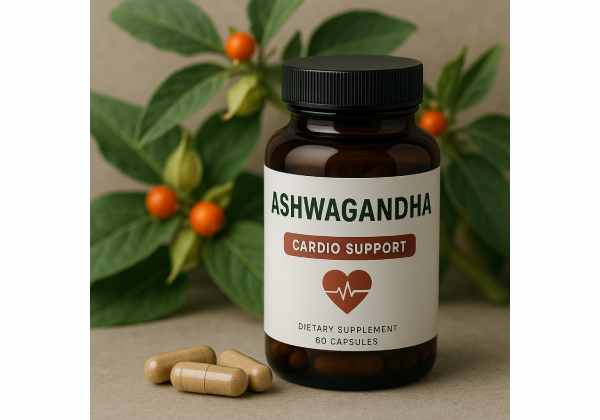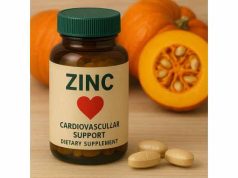
Ashwagandha (Withania somnifera) has long been revered as a potent adaptogenic herb, recognized for its ability to bolster resilience against stress, support overall vitality, and potentially enhance cardiovascular function. Often used in Ayurveda and other holistic wellness traditions, ashwagandha may play a key role in maintaining healthy blood pressure, mitigating oxidative damage, and improving heart performance. Whether you’re exploring natural remedies to prevent common cardiac disorders or looking to optimize existing heart health, this herb holds promise for multifaceted cardiovascular support. Read on to discover its active components, proven benefits, and practical guidelines for safe and effective use.
Table of Contents
- Background and Nutrient Composition
- Principal Mechanisms: How Ashwagandha Works
- Proven Effects for Cardiac and Vascular Health
- Guidelines for Safe Dosage and Usage
- Ashwagandha FAQ: Concise Answers to Common Questions
- Citations and Authoritative References
Background and Nutrient Composition
Ashwagandha, botanically known as Withania somnifera, is one of the most renowned herbs in Ayurvedic medicine. Native to regions of India, the Middle East, and parts of Africa, this small shrub has been cultivated for centuries primarily for its roots and leaves. The name “ashwagandha” combines the Sanskrit words for “horse” (ashwa) and “smell” (gandha), referencing the root’s distinctive aroma.
Ayurvedic Roots and Contemporary Acceptance
Within Ayurvedic philosophy, ashwagandha is classified as a rasayana—an herb that promotes longevity, youthfulness, and robust vitality. Traditionally, it has been applied in formulas to combat fatigue, enhance immune function, and regulate the body’s response to stress. Over time, scientific research has broadened our understanding of ashwagandha’s significance, pointing to potential roles in mental well-being, metabolic regulation, and, notably, cardiovascular support.
Key Compounds and Phytochemicals
The therapeutic properties of ashwagandha largely stem from its diverse array of active compounds:
- Withanolides
A distinct group of steroidal lactones (e.g., withaferin A, withanolide A) that contribute to the herb’s adaptogenic and anti-inflammatory actions. - Alkaloids
Substances such as somniferine and anaferine that may support neurotransmitter modulation and mild relaxant effects, indirectly assisting cardiovascular stability. - Sitoindosides
Believed to improve stress management and immune function; they can reinforce the synergy of withanolides. - Polyphenols and Flavonoids
Although present in smaller amounts compared to other herbs, these antioxidants help mitigate free radical damage, thereby aiding vascular health.
Nutritional Highlights
While ashwagandha is not primarily consumed as a dietary staple like leafy greens or grains, it does provide modest amounts of micronutrients:
- Iron: A supportive nutrient for blood health and oxygen transport.
- Calcium: Essential for muscle contraction and overall metabolic processes.
- Amino Acids: Some forms of ashwagandha supplements contain trace amino acids that may promote repair and growth at the cellular level.
Varied Supplement Formats
Modern users have many options for reaping ashwagandha’s benefits:
- Powdered Root: Often used in smoothies, teas, or mixed with warm milk—very common in traditional Ayurveda.
- Capsules and Tablets: Provide standardized dosages for convenience and consistent potency.
- Liquid Extracts: Tinctures or fluid extracts enable flexible dosing and may be absorbed quickly.
- Combination Formulas: Paired with other adaptogens like rhodiola or holy basil, ashwagandha works synergistically to optimize stress response and overall wellness.
Cultural and Traditional Context
Historically, ashwagandha has had a cultural footprint extending well beyond India. Perso-Arabic medical systems have adopted it for strength and virility, while some African communities used it for its restorative qualities. Its use in cardiovascular support is part of a broader tapestry of applications, highlighting the herb’s versatility.
In an era where heart disease remains a leading cause of mortality, ashwagandha’s stress-buffering potential and metabolic-balancing attributes make it an increasingly popular supplement. At its core, by modulating inflammation, supporting healthy blood pressure, and encouraging balanced metabolic pathways, ashwagandha emerges as a vital ally for maintaining a healthy cardiovascular system. The subsequent sections elucidate precisely how these intricate mechanisms function.
Principal Mechanisms: How Ashwagandha Works
To appreciate ashwagandha’s potential in promoting robust heart health, it helps to comprehend the underlying biological pathways. Far from a single-action herb, ashwagandha displays a multilayered effect, influencing endocrine, immunological, and metabolic processes. These combined actions can translate into meaningful protection and support for the cardiovascular system.
Stress Modulation and Cortisol Management
Chronic stress has profound implications for heart health: elevated cortisol levels correlate with hypertension, heightened inflammation, and a greater susceptibility to arterial plaque development. Ashwagandha, frequently classified as an adaptogen, aims to:
- Balance Cortisol Production
By modulating the hypothalamic-pituitary-adrenal (HPA) axis, ashwagandha encourages more stable cortisol levels, thereby reducing chronic stress’s detrimental effects on the heart. - Enhance Stress Resilience
The herb may improve the body’s capacity to navigate stressors—be they psychological or physiological—lowering the cardiovascular strain triggered by prolonged nervous tension.
Anti-inflammatory Pathways
Persistent, low-grade inflammation predisposes individuals to various heart conditions, including atherosclerosis. Ashwagandha’s withanolides have been studied for their:
- Suppression of Pro-inflammatory Cytokines
Such as interleukin-6 (IL-6) or tumor necrosis factor-alpha (TNF-α), known contributors to vascular damage. - Regulation of Immune Cell Activity
By mitigating hyperactive immune responses, ashwagandha can reduce the chronic inflammation burden that underpins many cardiovascular issues.
Antioxidant Potential
Oxidative stress, wherein free radicals accumulate beyond the scope of the body’s antioxidant defenses, is a pivotal factor in heart disease progression. Ashwagandha helps combat this through:
- Direct Free Radical Scavenging
Certain withanolides neutralize reactive oxygen species (ROS) before they harm cellular membranes or arterial linings. - Boosting Endogenous Antioxidants
Research suggests that ashwagandha can elevate the levels of natural antioxidant enzymes like superoxide dismutase (SOD) and glutathione peroxidase, offering a double shield against oxidative damage.
Metabolic Regulation and Lipid Profiles
Weight gain, insulin resistance, and lipid imbalances exacerbate cardiac risk. Preliminary evidence indicates that ashwagandha may:
- Improve Insulin Sensitivity
More efficient glucose uptake can indirectly preserve arterial integrity by reducing glycation and associated oxidative stress. - Moderate Lipid Levels
By decreasing LDL or total cholesterol in some individuals, the herb supports a healthier cholesterol ratio that can deter plaque accumulation.
Blood Pressure Stabilization
While ashwagandha isn’t primarily a blood pressure medication, its integrative effects on stress, inflammation, and metabolic pathways can bring synergy:
- Vasodilation
By reducing sympathetic overactivity (commonly seen under chronic stress), ashwagandha can facilitate vasodilation and foster more normal blood pressure readings. - Reduced Cardiac Workload
Less tension on the cardiovascular system means the heart expends less effort to pump blood, diminishing potential strain and wear over time.
Neurological and Hormonal Interplay
Emotional stress, sleep disturbances, and hormonal fluctuations can directly affect cardiac wellness. Ashwagandha’s adaptogenic attributes may:
- Support Thyroid Health
Balanced thyroid hormones are critical for heart rate control and metabolism. Some evidence suggests that ashwagandha can help modulate T3 and T4 levels, maintaining normal metabolic function. - Enhance Sleep Quality
Adequate rest is vital for cellular repair and maintaining stable blood pressure. Many users of ashwagandha report deeper, more restorative sleep, indirectly benefiting the heart.
Synergy with Lifestyle and Other Supplements
It’s worth noting that ashwagandha’s cardioprotective mechanisms are most effective when integrated into a broader context of balanced nutrition, regular exercise, stress management, and potentially complementary supplements like fish oil or coenzyme Q10. The herb’s actions complement, rather than replace, established cardiovascular health strategies.
By bridging stress adaptation, anti-inflammatory effects, antioxidant protection, and moderate lipid and glucose regulation, ashwagandha helps create an environment in which the heart and vascular system can thrive. The next section discusses scientific research that underscores these benefits, focusing on both clinical trials and observational data affirming ashwagandha’s place in the realm of cardiovascular support.
Proven Effects for Cardiac and Vascular Health
As modern medical and scientific communities delve deeper into age-old herbal remedies, ashwagandha has emerged as a compelling supplement for individuals concerned about cardiovascular well-being. A series of experiments, clinical trials, and pilot studies collectively illustrate its potential in managing blood pressure, cholesterol profiles, stress markers, and heart function.
Insights from Clinical Trials
- Reduction in Stress-induced Cardiac Strain
- Study Parameters: Individuals exposed to high levels of occupational stress or diagnosed with anxiety disorders were given ashwagandha extracts.
- Findings: Many reported lower perceived stress and measured improvements in heart rate variability (HRV). Stable HRV is frequently interpreted as enhanced resilience to emotional and physical stressors.
- Improvements in Lipid Profiles
- Design: Randomized, double-blind controlled trials investigating ashwagandha for metabolic syndrome or borderline hyperlipidemia.
- Results: Participants experienced modest yet meaningful declines in LDL cholesterol and triglycerides, and in some cases, an increase in beneficial HDL cholesterol. The synergy between stress reduction and mild metabolic support likely explains these positive changes.
- Blood Pressure Regulation
- Observations: Though not as widely studied in the context of hypertension as certain other herbs, several pilot studies suggest ashwagandha users notice mild drops in both systolic and diastolic blood pressure.
- Mechanism Hypothesis: Lower cortisol, improved vasodilation, and decreased inflammatory markers collectively contribute to these outcomes.
Role of Adaptogenic Actions in Cardiac Protection
Chronic stress is a silent yet potent driver of various cardiovascular complications. By diminishing cortisol surges and possibly modulating adrenaline, ashwagandha addresses one of the heart’s biggest adversaries:
- Support for Autonomic Balance
A well-regulated autonomic nervous system is less prone to episodes of tachycardia or sudden blood pressure spikes. - Integration with Psychological Approaches
In individuals coupling ashwagandha with practices like mindfulness or talk therapy, results often point to greater emotional regulation, indirectly shielding the heart from stress-induced damage.
Observational and Traditional Evidence
While randomized trials offer valuable quantitative data, the extensive historical use of ashwagandha in Ayurvedic medicine should not be discounted. Generations of practitioners have applied it in contexts of fatigue, weakness, and circulatory disturbances—challenges closely tied to compromised heart function. Documented case studies highlight:
- Enhanced Cardiac Endurance
Traditional accounts describe withania’s ability to strengthen physical stamina and heart capacity, validated by modern findings related to reduced oxygen consumption during workouts. - Post-illness Cardiac Recovery
Some accounts mention using ashwagandha in convalescence regimens for patients recovering from infections or other ailments that burden the cardiovascular system. Although anecdotal, these repeated observations provide a consistent narrative of supportive heart action.
Anti-inflammatory and Antioxidant Validation
Chronic inflammation and oxidative stress remain cornerstones of conditions such as atherosclerosis:
- Biomarker Tracking
Studies measuring markers like CRP (C-reactive protein) and IL-6 often note decreases in volunteers supplementing with ashwagandha. - Protection of Endothelial Function
By quelling the free radicals that degrade the lining of blood vessels, ashwagandha fosters conditions that can delay or mitigate plaque formation.
Synergies with Conventional Medical Treatments
Ashwagandha is sometimes considered alongside standard pharmaceutical or lifestyle interventions:
- Pairing with Statins or Beta-blockers
Early-stage investigations reveal that, when used under medical supervision, ashwagandha could amplify the stress-management and metabolic regulation benefits of standard heart medications. - Lifestyle-centric Approaches
In integrative clinics, ashwagandha is frequently layered with dietary changes, targeted exercise plans, and other adaptogenic herbs (like rhodiola or holy basil) to fully capture multifactorial benefits for the heart.
Potential Applications in Specific Cardiac Disorders
While the majority of data focus on ashwagandha’s general cardioprotective attributes, emerging lines of research are examining its role in discrete heart-related issues:
- Arrhythmias: Preliminary lab studies indicate that stress attenuation and anti-inflammatory effects might lessen the severity or frequency of certain irregular heart rhythms.
- Ischemic Heart Conditions: By improving oxygen utilization and reducing inflammatory load, ashwagandha might offer complementary support for individuals at risk of angina or post-cardiac events, though more in-depth studies are needed.
In essence, from refined scientific methodologies to centuries of anecdotal experiences, evidence underscores ashwagandha’s capacity to fortify cardiovascular wellness. Its strengths lie in addressing stress, inflammation, metabolic disruption, and mild fluctuations in blood pressure. The next section lays out clear, user-friendly instructions on how best to incorporate ashwagandha, balancing potency, safety, and synergy with any existing medical regimen.
Guidelines for Safe Dosage and Usage
Anyone considering ashwagandha for Heart Health should do so with adequate knowledge of dosage ranges, timing, and potential interactions. While the herb’s safety profile is widely recognized as robust, informed usage remains vital to achieving the best cardiovascular outcomes.
Commonly Recommended Dosages
- Powdered Root: Traditional Ayurvedic practice often suggests 1–2 teaspoons daily (approximately 3–6 grams), mixed into warm milk, ghee, or water. Beginners may start with a smaller amount, gradually increasing based on tolerance.
- Capsules or Tablets: Commercial products typically standardize withanolide content, offering 300–600 mg per capsule. A standard recommendation might be 600–1,200 mg split into one or two daily servings, depending on brand-specific formulations.
- Liquid Extracts: Tinctures can be measured by drops or milliliters, commonly ranging from 1–2 mL once or twice a day. Concentrations vary, so adhere to product guidelines.
Timing and Administration
- Morning vs. Evening: Some individuals find ashwagandha energizing and prefer morning use, while others experience calmness and choose bedtime dosing. Observing your personal reaction helps determine the ideal schedule.
- With or Without Food: Consuming ashwagandha with food may ease any digestive sensitivities. Traditional methods involve mixing with milk, promoting the assimilation of fat-soluble components like withanolides.
Safety Profile and Potential Side Effects
- Mild GI Upset: Occasional reports of nausea, upset stomach, or diarrhea occur, especially if dosage escalates too rapidly. Lowering intake or taking the supplement with meals often resolves these issues.
- Allergic Reactions: Rarely, ashwagandha can provoke an allergic response. Discontinue use if you notice rashes, itching, or breathing difficulties, and consult medical care.
- Sedative Effects: In individuals sensitive to adaptogens with calming properties, mild drowsiness can occur. Adjusting dosage timing can mitigate this effect if it is disruptive.
Possible Interactions with Medications
Because ashwagandha exerts broad physiological influence, individuals on certain prescriptions should proceed with caution:
- Thyroid Hormones: The herb can affect thyroid hormone levels, so those with thyroid imbalances need professional monitoring.
- Diabetes Medications: Potential improvements in insulin sensitivity may necessitate dose changes for insulin or oral hypoglycemics.
- Hypertensive or Anxiolytic Drugs: By lowering stress and possibly blood pressure, ashwagandha can amplify the effects of certain heart or anti-anxiety medications. Coordination with a healthcare provider is advised.
Populations Requiring Additional Precautions
- Pregnant or Nursing Women: Although ashwagandha is historically used in various contexts, insufficient research exists on large-scale safety for these groups. Seek specialized guidance before supplementing.
- Autoimmune Conditions: Owing to its immunomodulatory aspects, ashwagandha may not be suitable for some autoimmune patients. Medical evaluation can clarify whether usage is safe or beneficial.
- Post-operative Recovery: Consult medical professionals, as ashwagandha’s effects on sedation and the immune system may influence healing or medication interactions.
Storing and Handling
- Temperature and Light: Preserve efficacy by storing capsules or powders in a cool, dry location away from direct sunlight. Overexposure to heat can degrade the potency of withanolides.
- Expiration Monitoring: Regularly check product labels for best-by dates, especially for liquid extracts prone to oxidation or contamination after opening.
Integrating Ashwagandha into a Holistic Heart-Health Plan
While ashwagandha provides a robust set of adaptogenic and anti-inflammatory benefits, maximum cardiovascular advantages emerge when paired with complementary strategies:
- Balanced Nutrition: Emphasize whole grains, vegetables, fruits, and lean protein sources that sustain healthy lipid profiles.
- Exercise Routines: Activities like brisk walking, cycling, or moderate resistance training support vascular elasticity and weight management.
- Stress Management: Meditation, yoga, or mindfulness training can work in tandem with ashwagandha’s calming properties for optimal emotional and cardiac balance.
By adhering to these usage guidelines, most individuals experience a safe and beneficial relationship with ashwagandha for Cardiovascular Health. The next segment directly addresses frequently asked questions that prospective or current users often pose, providing concise, clinically relevant answers.
Ashwagandha FAQ: Concise Answers to Common Questions
How can Ashwagandha improve heart health?
Ashwagandha helps lower stress hormones, reduce inflammation, and moderate blood pressure. These actions collectively protect arteries from wear and tear, support normal blood flow, and lessen strain on the cardiovascular system, thus helping to prevent heart-related conditions.
Is Ashwagandha safe to use alongside my heart medication?
Ashwagandha generally complements standard heart medications but can amplify their effects. Consult a healthcare professional to monitor for lowered blood pressure or changes in lipid levels, ensuring safe dosage adjustments if necessary.
How long does it take to notice improvements in cardiovascular markers?
Results vary, but many people see shifts in stress management, blood pressure stability, or lipid profiles within 4–8 weeks of consistent use. Optimal benefits may require up to three months, particularly when combined with heart-healthy habits like exercise and proper nutrition.
Are there side effects linked with Ashwagandha for heart health?
Mild digestive upset is the most common complaint, usually minimized by adjusting the dose or taking it with meals. Rare allergic reactions can happen. Anyone experiencing unusual or severe symptoms should discontinue use and seek medical advice promptly.
Should I take Ashwagandha in the morning or at night for better heart support?
Either can be effective, and the best timing often depends on individual responses. Some feel more energized when taking ashwagandha in the morning, while others find its calming properties beneficial at night. Observe your reaction to determine the ideal schedule.
Citations and Authoritative References
- Scientific Journals and Databases
- Phytotherapy Research, Journal of Ayurveda and Integrative Medicine, and Indian Journal of Medical Research frequently publish clinical and preclinical findings on ashwagandha’s adaptogenic qualities and potential cardiovascular effects.
- PubMed (U.S. National Library of Medicine) maintains an extensive collection of peer-reviewed papers delving into ashwagandha’s active constituents and their roles in stress reduction, lipid management, and anti-inflammatory action.
- Ayurvedic Texts and Traditional Knowledge
- Ancient treatises like the Charaka Samhita and Sushruta Samhita document ashwagandha’s broad applications, including references to circulatory health.
- Contemporary Ayurvedic practitioners integrate historical usage with modern validation, offering a well-rounded perspective on dosage and synergy with other herbs.
- Clinical Investigations
- Randomized, double-blind controlled trials from academic institutions in India, Europe, and the United States evaluate ashwagandha’s ability to mitigate stress markers, refine lipid profiles, and support mild reductions in blood pressure.
- Systematic reviews and meta-analyses highlight consistent patterns of decreased cortisol and modest improvements in cardiovascular metrics.
- Healthcare Institutions and Integrative Medicine Centers
- Several integrative clinics and research centers, including the National Center for Complementary and Integrative Health (NCCIH), recognize ashwagandha’s adaptogenic role and endorse ongoing research into its heart-protective potential.
- WHO monographs and other herbal pharmacopeias occasionally list ashwagandha’s therapeutic benefits, underscoring its recognized place in global herbal medicine.
By exploring these sources, readers can deepen their understanding of how ashwagandha fosters cardiovascular well-being, from ancient textual references to cutting-edge clinical discoveries. Reviewing such authoritative materials solidifies confidence in the herb’s safety, efficacy, and capacity to complement a well-rounded approach to heart health.
Disclaimer:
This article is intended for educational purposes only and does not replace professional medical advice. Always consult with a qualified healthcare provider before introducing ashwagandha or any other supplement into your health regimen.
If you found this information helpful, please share it on Facebook, X (formerly Twitter), or your favorite social media platform. We invite you to follow us on social networks for more insights into natural strategies for maintaining a strong, healthy heart!






